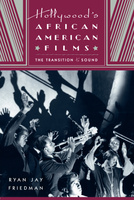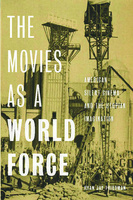Ryan Jay Friedman
Showing 1-4 of 4 items.
Hollywood's African American Films
The Transition to Sound
Rutgers University Press
In 1929 and 1930, during the Hollywood studios' conversion to synchronized-sound film production, white-controlled trade magazines and African American newspapers celebrated a "vogue" for "Negro films." "Hollywood's African American Films" argues that the movie business turned to black musical performance to both resolve technological and aesthetic problems introduced by the medium of "talking pictures" and, at the same time, to appeal to the white "Broadway" audience that patronized their most lucrative first-run theaters. Capitalizing on highbrow associations with white "slumming" in African American cabarets and on the cultural linkage between popular black musical styles and "natural" acoustics, studios produced a series of African American-cast and white-cast films featuring African American sequences. Ryan Jay Friedman asserts that these transitional films reflect contradictions within prevailing racial ideologies--arising most clearly in the movies' treatment of African American characters' decisions to migrate. Regardless of how the films represent these choices, they all prompt elaborate visual and narrative structures of containment that tend to highlight rather than suppress historical tensions surrounding African American social mobility, Jim Crow codes, and white exploitation of black labor.
- Copyright year: 2011
Hollywood at the Intersection of Race and Identity
Edited by Delia Malia Caparoso Konzett
Rutgers University Press
This collection of essays examines intersectional identities of race/ethnicity, gender/sexuality, class, and nationality in Hollywood cinema. Intersectionality, traditionally associated with social activism, is used here more liberally as a critical and analytic tool to explore films, expressing multiple points of views and multiple ways of looking at films.
- Copyright year: 2020
The Movies as a World Force
American Silent Cinema and the Utopian Imagination
Rutgers University Press
The Movies as a World Force is the first analysis of utopian cinema writing; situating it in its proper intellectual contexts, theology, and political philosophy; and illustrating the ways in which its utopian imagination shapes and is shaped by the era’s most prestigious film genre, the historical crowd epic.
- Copyright year: 2019
Hollywood at the Intersection of Race and Identity
Edited by Delia Malia Caparoso Konzett
Rutgers University Press
This collection of essays examines intersectional identities of race/ethnicity, gender/sexuality, class, and nationality in Hollywood cinema. Intersectionality, traditionally associated with social activism, is used here more liberally as a critical and analytic tool to explore films, expressing multiple points of views and multiple ways of looking at films.
- Copyright year: 2020
Stay Informed
Subscribe nowRecent News




